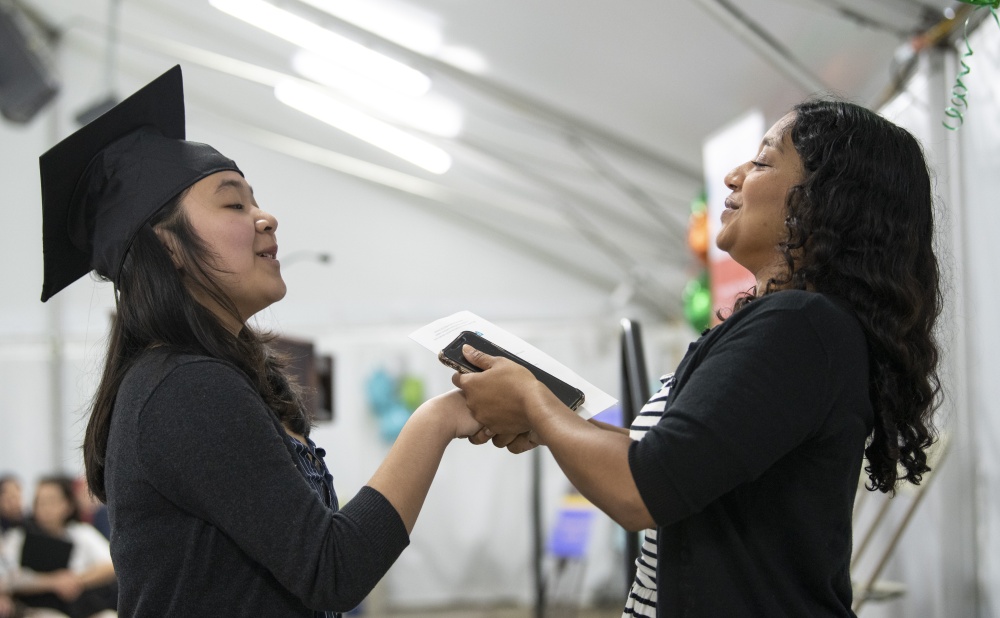For the MGH Youth Scholars 12th grade program, the end of the school year is ordinarily a time filled with joy, excitement and celebration. But this year is different. For the Class of 2020, fun end-of-year events like senior sweater day are no more. In-person graduations, class days and proms have been cancelled or postponed. Even plans for the fall semester of college are mired in uncertainty.
“This class of scholars has always defined itself as being remarkably motivated and determined,” says Laureanne DePina, college readiness program coordinator, whose role is to guide the students through their final high school year and the complexities of the college application process. According to Depina, diligent preparation has defined the Class of 2020, with almost half the cohort applying through early action in November. Nevertheless, she says, “Getting into college is not the hard part. It’s hard to be these students with what they have had to overcome.”
Indeed, for many students the path has not been easy. MGH Youth Scholars are selected for their interest in health care, but also for their unique life circumstances. They are from Chelsea, Revere, Dorchester, Roxbury, Mattapan—communities particularly hard hit by the coronavirus pandemic. The students are predominantly young people of color, and many are immigrants, from lower-income families and the first in their families to attend college. While striving for academic success, they are juggling extracurricular activities, part-time jobs and substantial family responsibilities.
Now, the coronavirus has made these students’ lives even more challenging, with the pandemic exposing deep, longstanding health care disparities in their communities. And, recent racist incidents of police brutality, spurring national outrage and protest, have added to the stress during this unprecedented time.
Yet, some are still working during this crisis to help support their families. Two have contracted coronavirus themselves, raising concerns about their families’ health and how they will supplement the income lost from being unable to work.
Along with that, the transition to online learning at the end of the school year has not been easy for many students. Not everyone has a private room with a desk and chair, and internet access can go in and out. While parents are still working, students have found themselves taking over childcare for younger siblings. With no school or libraries open, they are at home more than ever before. Those with challenging family dynamics at home have it most difficult as school was a safe place for them.
Throughout it all, though, DePina tells her students, “This is a moment where you’re really going to get to know yourself.”
The youth programs staff has also had to adapt to a new way of doing things. Ordinarily, following the rigors of the fall college application process, the spring is filled with exciting learning opportunities at the hospital. But, in March, departments were already cancelling workshops. In-person rotations in surgery, organ transplant, even the Boston MedFlight landing at the Mass General helipad, had all been cancelled.
While not able to hold programming in person, staff have been working hard to support these young people and their families. Each cohort meets virtually once a week. Programming designed to help them deal with issues around racism, identity, microaggressions and mental health as they transition to college have been held virtually as they are now more important than ever.
Staff have also been helping students deal with economic concerns exacerbated by the pandemic. Social worker Katie Chung has compiled resources around housing, food and other essentials, and $50 grocery store gift cards have been offered to families in need.
But the pandemic cannot overshadow the many accomplishments of these scholars. Two are high school salutatorians. Out of the 29 students in this year’s class, 27 of them will be headed to four-year undergraduate institutions, with five going to Ivy League schools. One was awarded the prestigious Red Pine Scholarship for up to $20,000 towards any college in Massachusetts, and some are attending college with full scholarships.
DePina’s hope is that regardless of how the pandemic carries on, the students can continue with their post-secondary plans in a safe capacity. Indeed, they are looking forward to the next step in their journeys. One scholar remarked, “I’m excited to see how my work will pay off throughout my years of college. We didn’t get to finish high school the way we wanted to, so in college I hope we get to see how it pays off.” Another says, “I want to experience all the college-y things. Living in a dorm, going out with friends, taking classes never offered in high school.”
Asked how they are coping following recent tragic events, DePina says, “They are angry, sad and upset, but they are also brave and outspoken.” Some students have attended protests, and others are involved with organizing protests in their communities. With college and new life experiences on the horizon, many are looking forward to continuing their advocacy and strengthening their voices to make change.
As their track record demonstrates, the MGH Youth Scholars Class of 2020 will keep marching forward through high school graduation and beyond. While they prepare for the next stage with a great deal of uncertainty, DePina is confident they will prevail. “They’ve been challenged by so many things in their lives that of course they’re able to handle this. If any class can get through this moment and thrive, it would be them.”

